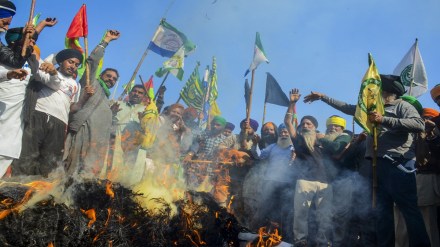By N Chandra Mohan
Ahead of the forthcoming national elections, farmer unions, especially from Punjab, are again restive after they forced the ruling NDA regime to scrap three farm laws couple of years ago after a year-long agitation. There is a clear and present threat of protestors heading for the nation’s capital if negotiations with government representatives remain stalemated. During the last couple of months, European farmers on tractors have also taken to the streets from France to Greece before the European Parliament elections in June. Farmers are a powerful electoral lobby both in India and Europe, where farm subsidies of €60 billion account for a third of the European Union’s budget, and their ongoing protest makes for terrible optics before elections.
Farmer demands of course vary. But the dominant narrative of their global protest is that cultivation at the margin is getting increasingly unviable due to costlier inputs. They are exposed to the vagaries of climate change and extreme weather. Farming thus entails huge and growing risks but yields meagre incomes. While their costs of production have steadily risen, the prices paid to them have steadily fallen or at best stagnated. In other words, the terms of trade have deteriorated against agriculture, setting up the current confrontation between the countryside and town. As if all of this weren’t bad enough, Europe’s net zero policies and the Green Deal particularly hits farmers as agriculture accounts for 10% of EU’s greenhouse gas emissions.
In India, farmer demands are also similar to that of their earlier agitation, but their main demand is for a legal guarantee for minimum support prices for 23 crops to shore up their incomes. These farmers are from a region which was the biggest beneficiary of the Green Revolution since the late 1960s. The movement made the country self-sufficient in wheat and rice as the government provided high-yielding seeds and fertilisers. MSPs were announced and the Food Corporation of India bought whatever farmers produced. They are much richer than their counterparts in the rest of the country as they operate relatively larger farm sizes. As such, relatively prosperous farmers protesting clearly testifies to the agrarian distress that stalks the land.
In Europe, French farmers have been demanding better incomes, less bureaucracy, and measures against foreign competition. The proximate cause for their unrest was the government’s plans to reduce tax rebates on agricultural diesel. Although it backed down, the protests—comprising impoverished small farmers of the southwest—continued with their tractors blockading eight motorways leading to the nation’s capital to remind denizens to not ignore the people who toil to produce their food. For a country that is EU’s leading agricultural producer, the farmer unrest poignantly highlights a fast-vanishing way of life as their population has drastically shrunk over time, with those remaining much older in age.
Greek farmers, for their part, have been adversely impacted by climate change and extreme weather. Last year, wildfires through the north wiped out a fifth of annual farm revenues. There was unprecedented flooding that inundated farm land in the central region, one of Greece’s bread baskets. Farmers naturally demand compensation for damage from natural disasters besides tax-free fuel, debt waivers and protection from cheaper imports. The last-mentioned demand recurs throughout Europe as farmers are affected by cheaper grain imports from war-torn Ukraine and free trade agreements the EU is negotiating. These could lead to increased imports of meat and livestock products, driving down prices and lowering the incomes of EU farmers.
The tenacity of Indian farmers’ demands that the MSP regime be legally guaranteed in writing is a red line for any government, regardless of its political complexion. There is no way that this demand can be conceded as it entails a huge fiscal cost, although the ruling dispensation has secured some space to negotiate on their demands after the recent WTO ministerial 13 at Abu Dhabi. India’s elusive quest for a permanent solution to the issue of public stockholding for food security purposes might be kicked down the road for the next ministerial, but it can claim that it retains full policy space for the benefit of farmers. But how far will it go, as its earlier efforts to extend to MSPs to five more crops were rejected by the farmers?
Similarly, in Europe, while there is a retreat on the planned increases in fuel taxes and some of the Green Deal measures like reducing pesticides, leaving part of the farmland fallow, or how hedgegrows should be tended, the question is how can this arrest the inexorable decline in small family farm holdings that account for the bulk of all farms in the EU? Even in France, while their numbers are dramatically shrinking, there is a process of consolidation underway with a significant presence of larger farms, where four out of every ten farms have at least 50 hectares, according to the European Parliamentary Research Service. The nation has some of the biggest agribusiness giants too. The global farmer unrest forcefully underscores the complexity of ensuring cheap food production together with decent incomes for those who till the land.
N Chandra Mohan, The writer is an economics and business commentator based in New Delhi. Views are personal
